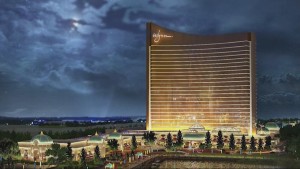Las Vegas billionaire Steve Wynn just hit a massive pothole in his long and bumpy road to opening a casino in Massachusetts.
Every conceivable – and inconceivable – lawsuit has been filed against Wynn and the Massachusetts Gaming Commission since state lawmakers approved plans for three large casinos across the state way back in 2011. There was even a failed state-wide referendum in 2014 that tried to repeal the Massachusetts casino law.
While it typically takes states two or three years to open a casino, we are now at six years and counting, with the crown jewel of the state’s budding gambling industry, Wynn Resorts’ $2.4 billion Everett gambling palace, not expected to open until next year.
So just when things seem to have finally calmed down for state’s budding casino industry, a Category 5 hurricane of sexual abuse allegations is now bearing down on Wynn, the man behind the gambling and entertainment tower complex taking shape on Boston’s border.
The Massachusetts Gaming Commission was quick off the block, announcing an immediate investigation into the allegations, as the casino license held by Wynn is conditional upon proof of “good character” as well as “integrity” and “honesty.”
“The people of Massachusetts have a right to know what the hell is happening here with no punches pulled,” Steve Crosby, the gaming commission’s chairman, fumed last week.
Yet no matter what the MGC does, there is no easy way to separate the huge casino taking shape in Everett from Wynn, whose name. as it stands now, will be on the casino tower for all to see – and whose brand state regulators chose quite deliberately.
The allegations against Wynn are some seriously sordid stuff, including a $7.5 million settlement with a manicurist who claimed that Wynn pressured her into having sex with him.
The Wall Street Journal reported that it had contacted 150 people who had worked with Wynn, with dozens reporting sexual misconduct, including assault in some cases.
Pushing back, Wynn said in a statement that “the idea I ever assaulted any woman is preposterous” and chalked it up to a negative public relations campaign by his ex-wife. Elaine Wynn has denied involvement.
The MGC met last Wednesday to discuss the situation, though realistically, its options are limited.
Certainly it would be foolish and wrong to pull the casino license from Wynn Resorts and shut down the whole project. That would effectively punish thousands of people who are currently building the new casino and those who hope to someday land jobs there.
Instead, some suggest the gaming commission should ensure that Wynn, in the words of Jay Gonzalez, former Gov. Deval Patrick’s budget chief, “divest” and “disassociate” himself from the huge casino his company is building in Everett.
Yet exactly how that would work remains to be seen. The name of the casino is Wynn Boston Harbor – does that mean Wynn’s name should come off the project? If so, wouldn’t the whole casino lose a significant part of its appeal? After all, Wynn is perhaps the biggest name in casinos; his is a powerful brand built over many years.
In fact, it was arguably the Wynn brand that won the day when Wynn Resorts edged out Mohegan Sun in September 2014 in the high-stakes competition for the Boston-area casino license.
The Wynn vision was for an upscale resort casino that would attract high rollers from across the world, not just local gamblers looking for a convenient place to play the slot machines. Wynn’s proposal called for pumping more dollars into the construction of the casino and its materials than the rival plan by Mohegan Sun.
This wasn’t supposed to be just any casino, but rather a Wynn casino, built with the best materials and providing a world-class experience. It is this image of a classy gambling palace that Wynn spent decades carefully building.
Any action the MGC takes against Wynn will further add to the beating Wynn’s brand is taking. And that, in turn, potentially damages the returns the gaming commission – and the state of Massachusetts – stand to reap from the casino.
What’s my point? The commission needs to take action. After all, it is Wynn’s own alleged actions that now threaten to unravel his gambling empire.
In the end, though, there is no easy way to separate Wynn from the casino brand and empire he built and from the huge gambling palace slated to open next year in Everett. Demanding that he “divest” and “disassociate” himself from the new casino sounds far easier than it will be in practice.









